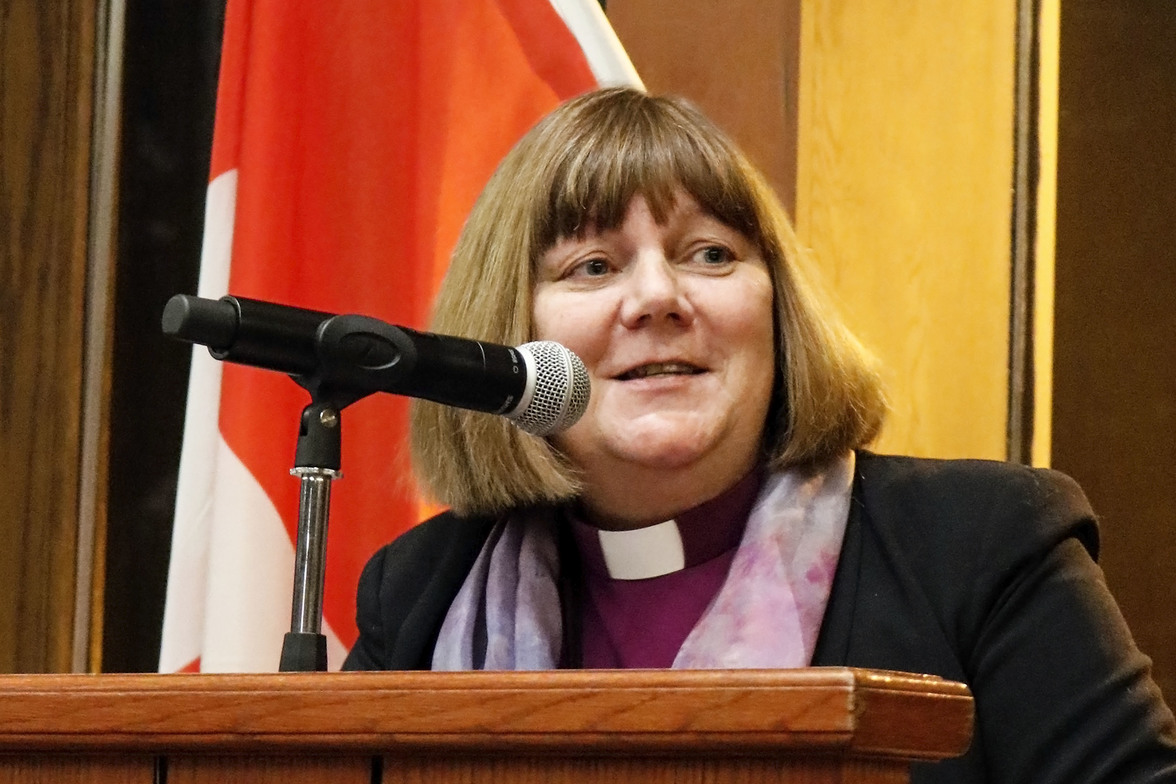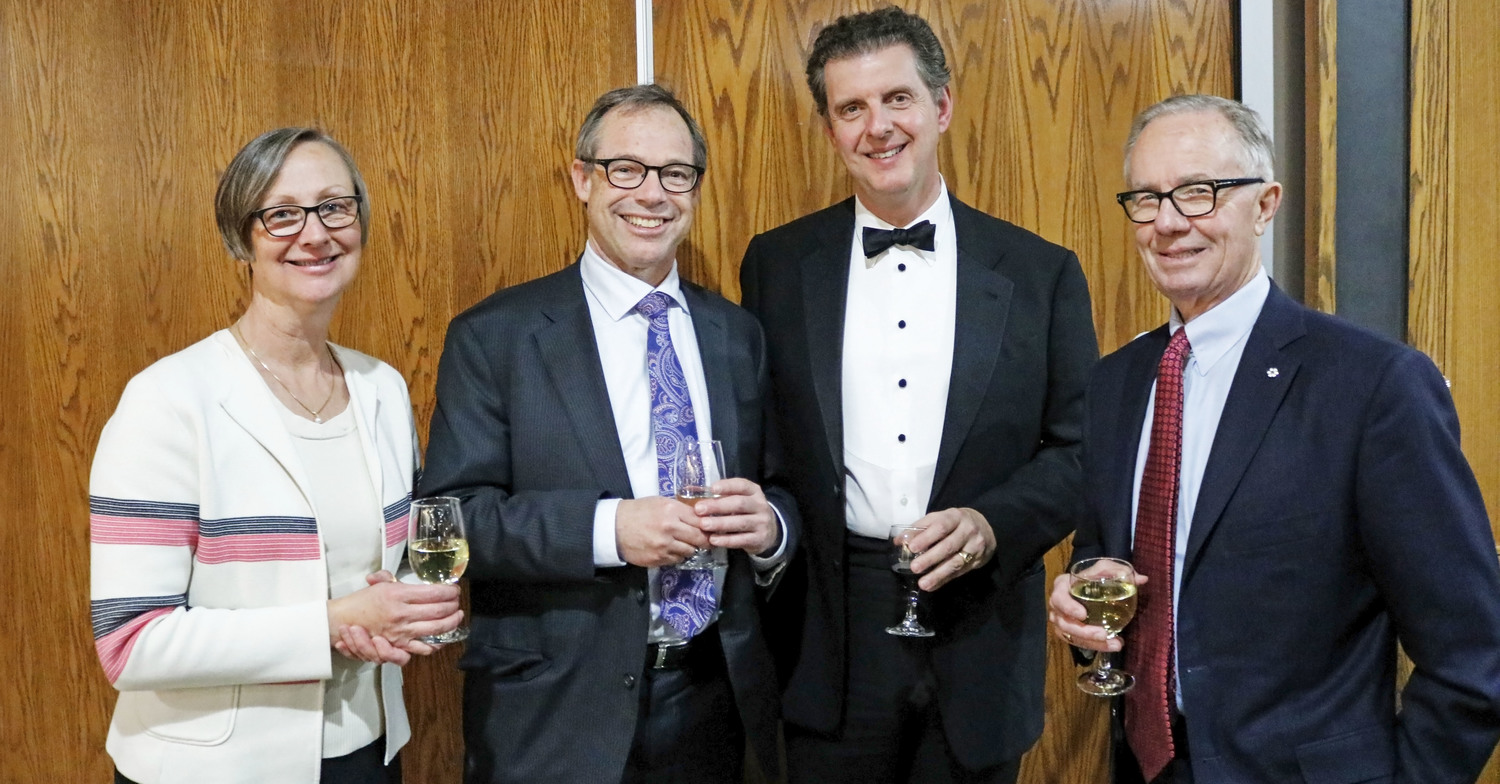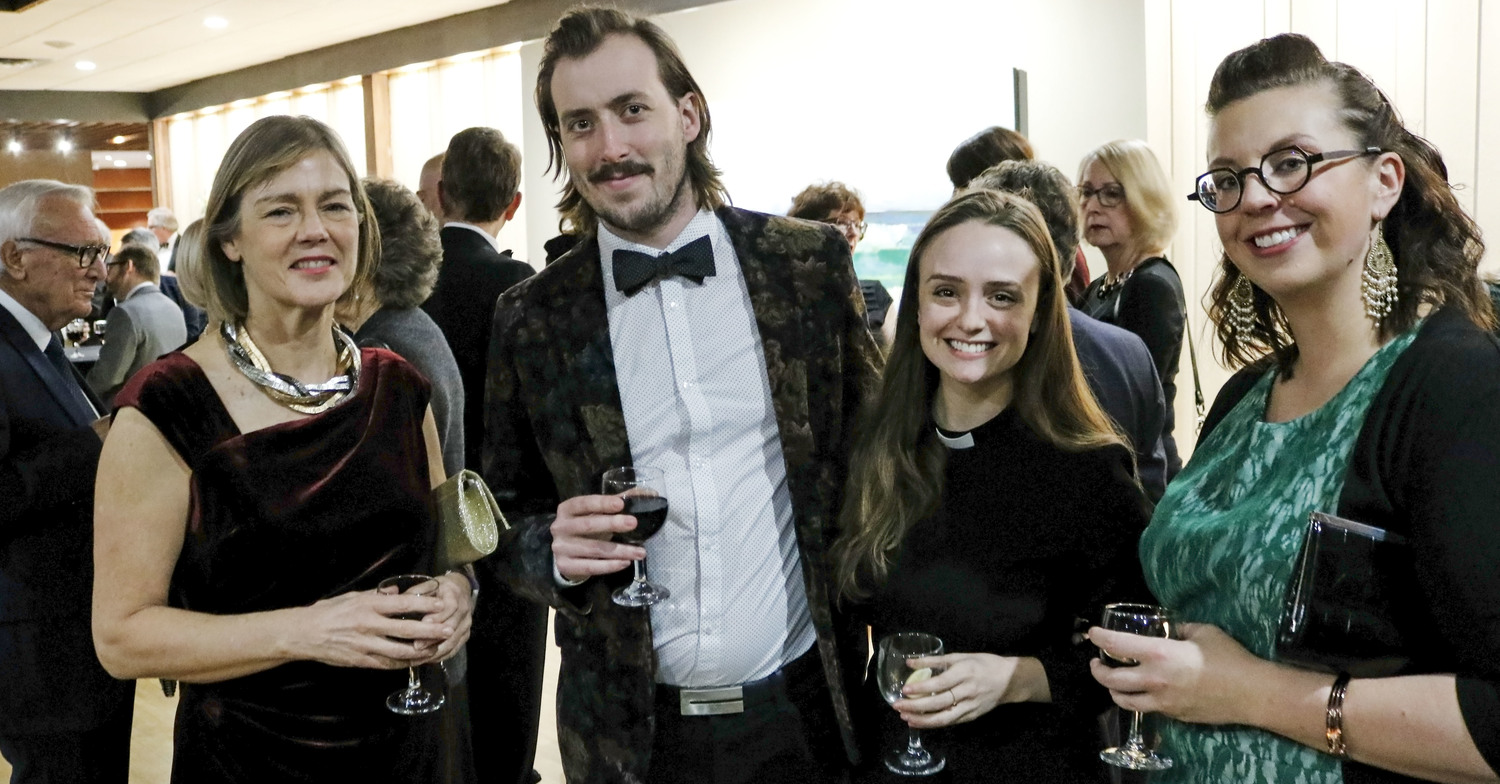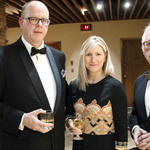More than 100 Anglican laypersons, clergy and friends gathered November 15th at the Royal Mayfair Golf Club in Edmonton for the 66th Annual Bishop’s Fund Dinner. Piper Kevin Thompson led the procession of Bishop’s Fund Committee members into the dinner. Committee chair L. Neil Gower, Q.C. welcomed supporters to the dinner and offered words of remembrance and a moment of reflection for members who are deceased.
The Bishop’s Fund was organized in 1951 by a group of generous Anglicans, at that time known as the Bishop’s Men, in support of Anglican clergy facing unexpected hardships. It is now comprised of a diverse group of people, who donate to the fund in support of Anglican clergy. Members of the Bishop’s Fund Committee organize and pay for the annual banquet and 100 per cent of the proceeds from annual memberships are donated to a discretionary fund for the Bishops of the Dioceses of the Arctic and Edmonton.
Bishop Jane Alexander expressed her heartfelt gratitude on behalf of the clergy of the Dioceses of Edmonton and the Arctic.
“It’s been my greatest joy to serve as a priest, and now a bishop, in the Anglican church, but just as there are particular joys and privileges that come with this ministry, there are also particular stresses in the role of the clergy. She began her address by quoting well-known American pastor Brian D. McLaren, who, in writing for Ministry Matters, said that: “Pastors face expectations that range from challenging to oppressive to depressing to maddening to ridiculous. Pastors have to make tough choices balancing the needs of individuals and the needs of the community, needs of the congregation and needs of the staff, not to mention their own needs and those of their families.” McLaren states: “Pastors are called in to deal with life’s toughest realities — death, divorce, illness, prison, domestic violence, drugs, racism. And through it all, Pastors have to keep congregations of diverse people together — even when political campaigns and culture wars try to divide us. And they’re often so busy helping others that they don’t even hear a little voice inside them crying for help.”
“And you my friends of the Bishop’s Fund,” said Bishop Jane, “you offer not just words of encouragement, but you offer means of encouragement... you provide space for people to be restored. I have to tell you that we are blessed to have so many people coming forward for ordination in the Edmonton diocese. Our last ordination saw 10 people ordained as priests and deacons. God is continuing to call people forward into ministry and, as bishop, I have the joy of knowing that there is support for all of them. If an extraordinary need arises, as it so often does, there is help. And it is so much appreciated. In the Diocese of the Arctic, where we send some of our support, you need to know that many of the clergy are non-stipendary, which means that they do not have many of the supports and luxuries we have here. People are often required to travel outside their own communities for additional help, treatment and support - a very expensive proposition.”
“We never squander or waste a single penny that you give and yet we spend every penny of it every single year,” Bishop Jane told fund supporters. “Thank you for being family to the clergy of the Dioceses of Edmonton and the Arctic; for standing together with them; for your goodness and for your compassion. And may God bless you always. Amen.”
Over the past six decades, the Bishop’s Fund banquet has featured many distinguished guest speakers. Past committee chair David A. Angus introduced Dr. Kenneth Rockwood, a leading authority on the study of frailty, aging and Alzheimer’s treatment and research, to give his perspective on medical assistance in dying.
“For 25 years, my practice as specialist in internal medicine and geriatric medicine has put me in conversation, and in touch, with people who are dying,” said Rockwell. “On the question of whether to provide medical aid to people who are dying - of the sort which aims to hasten death - however, I’ve been more content in a justly deserved obscurity. That’s because I am not really sure that I understand well enough all the implications of Medical Aid in Dying.”
The grandson of Anglican minister the Rev. Gordon Templeton, Rockwood was raised in Newfoundland and is the only lay member of the Bishop of Nova Scotia and PEI’s Committee on Medically Assisted Death. Rather than reflecting on the Carter decision (the Supreme Court of Canada decision that struck down the federal prohibition on physician-assisted dying), he chose instead to share his experience in treating people at the end of their lives. As a professor of medicine (geriatric medicine and neurology) at Dalhousie University and a staff physician at the Queen Elizabeth II Health Sciences Centre in Halifax, NS, Rockwood said his ambivalence about the issue arises from two important parts of his practice.
“For many years it has been my great privilege to care for many people with progressive and fatal neurodegenerative disorders (including friends and senior colleagues), and for their families. Our interactions are often important and poignant - sometimes humorous, and sometimes tragic. It can be a searing experience to care for someone with an advanced neurodegenerative disorder, whose mind is still largely intact but who is physically suffering. It is all the more searing when they are in a state that they had feared and explicitly stated that they did not wish to endure.” In witnessing that anticipatable suffering, Rockwood concluded that someone who is competent to make decisions should have the right to self-regarding judgement and to ask for assistance.
“When they’ve anticipated medical assistance in dying for several years, and you’ve spoken with them about it several times, and you see that they’re at the point when they’re asking for it as statement consistent with the way you’ve always known them; that they’ve identified a point of intolerable suffering to which death is actually preferable, then I no longer find that controversial,” he said.
He is more concerned about how the option of Medically Assisted Death will impact the care of his frail, elderly patients.
“People are frail as a consequence of multiple interacting medical and social problems. What is happening, and what is a real challenge for healthcare and Canadians, is that people are presenting as ill when it’s not clear which problem should be given the most consideration. There is a real mismatch between patients’ needs and what we as healthcare providers can offer. We must see a massive shift in the ideas we have had about the dominance of the subspecialists – the person who knows a lot about “a” thing. What we have to understand is that for most people that expertise is irrelevant. We need to structure how we provide care, so that we make care more relevant,” said Rockwood.
“Under the new legislation,” he explained, “people are likely to die against their will when they present with a problem and are treated by a subspecialist group which makes decisions outside the context of everything else that’s wrong with that person. But now we’re doing it with at least a societal sanction: if this doesn’t work out and you don’t get your ideal outcome we have ways of dealing with that, too. I am certain this is a risk for us. We, as a profession, as a society and as a country, are at risk if we don’t come to grips with the fundamental issue of aging. We need to have more patient-focused, rather than parts and organ-focused approaches to care. I think this is one of the times we will come to regret not having put in place the procedures to allow a more patient-centered understanding of health and dying.”
The remedy, Rockwood suggests, is rooted in transparency and dialogue. “We can start by knowing how many people have asked for Medical Aid in Dying, how many have received it, and the nature of their illnesses,” he said. “There are many uncertainties with the path we are now on. I worry that if handled badly, the legislation will foreclose discussion, prematurely forcing people to take a position so that a particular outcome might be achieved. I worry about the political and bureaucratic instinct to be blind to unintended outcomes – something we must be alert to in the church, as well.”
Rockwood graciously donated his speaker’s honorarium to the Bishop’s Fund.
The Anglican Church of Canada’s pastoral response to Physician Assisted Dying, a report called In Sure and Certain Hope, can be viewed here.
To make a donation to the Bishop’s Fund or to become a member, please contact Neil Gower by email at: lngower@gmail.com











































